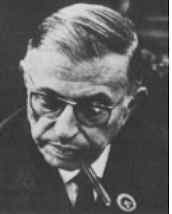Sartre and De Beauvoir met as students at the Sorbonne in Paris. This was the start of a love affair that lasted 50 years. Famous the world over as the odd couple, they never married or shared a common property. They lived in hotels and ate in cafes. But they did share a common philosophy.
Their particular brand of thinking is called existentialism - so named because it focuses on individual human existence. The idea is that only people are creative. They are free to rise above their creaturehood and create their own lives. Sartre said:
"MAN
makes HIMSELF"
 Although de Beauvoir never had children of her own, she is known as the "mother of feminism". Her book "The Second Sex" was the first real attempt to explore why women allowed themselves to be dominated by men. Like Sartre, she came from an upper - class family. But the de Beauvoirs lost their money. When the servants left, all the domestic chores fell upon her mother, who resented her lot but never questioned that housework was a woman's duty.
Although de Beauvoir never had children of her own, she is known as the "mother of feminism". Her book "The Second Sex" was the first real attempt to explore why women allowed themselves to be dominated by men. Like Sartre, she came from an upper - class family. But the de Beauvoirs lost their money. When the servants left, all the domestic chores fell upon her mother, who resented her lot but never questioned that housework was a woman's duty.
The young de Beauvoir wasn't slow to notice the unfairness of it all. She thought people should be free from prejudices about the sexes.
Sartre saw life as one gigantic stage, and people were actors condemned to a lifetime performance. However, people are free to write their own "scripts" and can not blame anyone else for their "bad performance". Those "actors" who allow themselves to be pushed into a role by others are denying that they are free to choose.
In de Beauvoir's case this would have been behaving the way that society expected women to behave.
The stars on life's stage are those who accept their freedom and make their own choices. They always take responsibility for their actions, whether these bring success or disaster.
"Education gives women the chance to break free from oppression by using brain power"
Sartre wrote many plays and also acted in many of them
He liked drinking, smoking and hanging about in cafes
"people who live in type cast roles are not living at all..."
"women are oppressed by mundane tasks and are invisible in the world of philosophy"
de Beauvoir wrote a book about female oppression called "The Second Sex"


 Although de Beauvoir never had children of her own, she is known as the "mother of feminism". Her book "The Second Sex" was the first real attempt to explore why women allowed themselves to be dominated by men. Like Sartre, she came from an upper - class family. But the de Beauvoirs lost their money. When the servants left, all the domestic chores fell upon her mother, who resented her lot but never questioned that housework was a woman's duty.
Although de Beauvoir never had children of her own, she is known as the "mother of feminism". Her book "The Second Sex" was the first real attempt to explore why women allowed themselves to be dominated by men. Like Sartre, she came from an upper - class family. But the de Beauvoirs lost their money. When the servants left, all the domestic chores fell upon her mother, who resented her lot but never questioned that housework was a woman's duty.